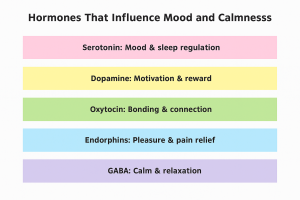Your mood and mind are deeply connected, not just to your daily stress or relationships, but also to the nutrients that fuel your body. While traditional medicine often separates emotional health from physical health, new research highlights the deep relationship between brain chemistry, diet, and the gut-brain axis. At Eat for Life, we support people experiencing anxiety, brain fog, irritability, and emotional exhaustion by restoring biochemical balance through nutrition.
We take a functional approach to supporting emotional resilience, one that recognizes the interplay between nutrition, hormones, digestion, and neurotransmitter support.
How Nutrition Affects Mood and Brain Function
Emerging studies confirm that nutrition plays a central role in mental wellness. The brain is metabolically demanding, requiring steady access to amino acids, B vitamins, essential fatty acids, and minerals to maintain clear thinking, stable energy, and a balanced mood.
For example, serotonin is synthesized from the amino acid tryptophan with the help of vitamin B6, magnesium, and iron. Dopamine, which supports motivation and focus, is derived from the amino acid tyrosine and requires vitamin C, folate, and copper. Even slight deficiencies in these nutrients can lead to sluggish cognitive function, emotional instability, or an increased stress response.
Additionally, gut health plays a central role in neurotransmitter production. The gut produces over 90% of the body’s serotonin and is a major site of nutrient absorption and regulation of inflammation. Supporting digestion is therefore essential for mental clarity and mood stability.
We all know that nutrition is important, any physician can point us to endless studies showing the importance of nutrition for brain health. But, sometimes knowing the “how” is more difficult then anything else.
Hormones That Influence Emotional Wellbeing
Below is a visual representation of key hormones that impact mood, calmness, and connection:
These hormones include serotonin, dopamine, oxytocin, endorphins, and GABA. Their function is influenced not only by genes or personality, but also by nutrient intake, gut integrity, and exposure to chronic stress. These hormones play a major role in mental clarity, sleep, social bonding, and the ability to manage daily challenges with greater calm.
Mood and Mind Through the Lifespan
Nutritional needs shift with age, and so does brain chemistry. Children and teens require nutrients like iron, zinc, and omega-3 fats for proper emotional development and learning. Teenagers are especially vulnerable to emotional swings when nutrient intake is poor, which can affect serotonin and dopamine production.
In adulthood, nutrient depletion becomes more common due to chronic stress, poor sleep, environmental toxins, and blood sugar instability. Many adults experience hormone shifts that affect neurotransmitter production and can worsen anxiety or fatigue. For women, fluctuations in estrogen and progesterone during perimenopause can disrupt serotonin and GABA balance, leading to sleep disturbances and mood swings.
Older adults may struggle with the absorption of vitamin B12, magnesium, and other nutrients critical for neurotransmitter synthesis and brain function. Inflammation and oxidative stress also tend to increase with age, which can compromise emotional stability and cognitive health if left unaddressed.
By supporting nutrient density, gut-brain connection, and inflammation management, we can protect emotional health at every stage of life.
A Whole-Body Approach to Emotional Health
At Eat for Life, we recognize that emotional symptoms are rarely isolated from physical symptoms. We look at how the digestive system, hormone network, nervous system, and inflammatory patterns contribute to mood disorders and emotional fatigue.
Our approach begins with thorough assessments of your current state of well-being. These tools help us uncover the hidden reasons behind mood shifts, irritability, brain fog, or burnout.
We then design a personalized strategy to support the body’s natural biochemistry. This often includes:
- Adjusting macronutrients to balance blood sugar and reduce cortisol overactivation
- Supporting digestion to optimize neurotransmitter production in the gut
- Replenishing missing nutrients like vitamin B6, folate, magnesium, and omega-3s
- Restoring circadian rhythm to regulate melatonin and cortisol
- Coaching stress reduction and meal timing techniques for emotional regulation
By targeting the underlying imbalances, we promote real change, not just symptom management. Our clients experience more emotional resilience, better focus, and a renewed sense of control.
Why Choose Eat for Life
If you’ve been told everything is fine but still feel off, it’s time to dig deeper. At Eat for Life, we specialize in connecting the dots between your physical symptoms and emotional struggles. We’re not just treating the mind, we’re treating the whole person.
Clients work with us because we:
- Use advanced testing to uncover the root causes of emotional imbalance
- Personalize plans that are grounded in clinical nutrition science
- Support the mind and body together, instead of treating them as separate systems
- Provide compassionate, step-by-step guidance that meets you where you are
Whether you’re dealing with chronic stress, mood swings, or simply feeling mentally flat, our holistic process is designed to support long-term recovery and emotional wellbeing.
Are you ready to reclaim your energy, clarity, and calm?
Book a free discovery session with our functional nutritionist today and find out how a personalized plan can support your body, mood and mind.










